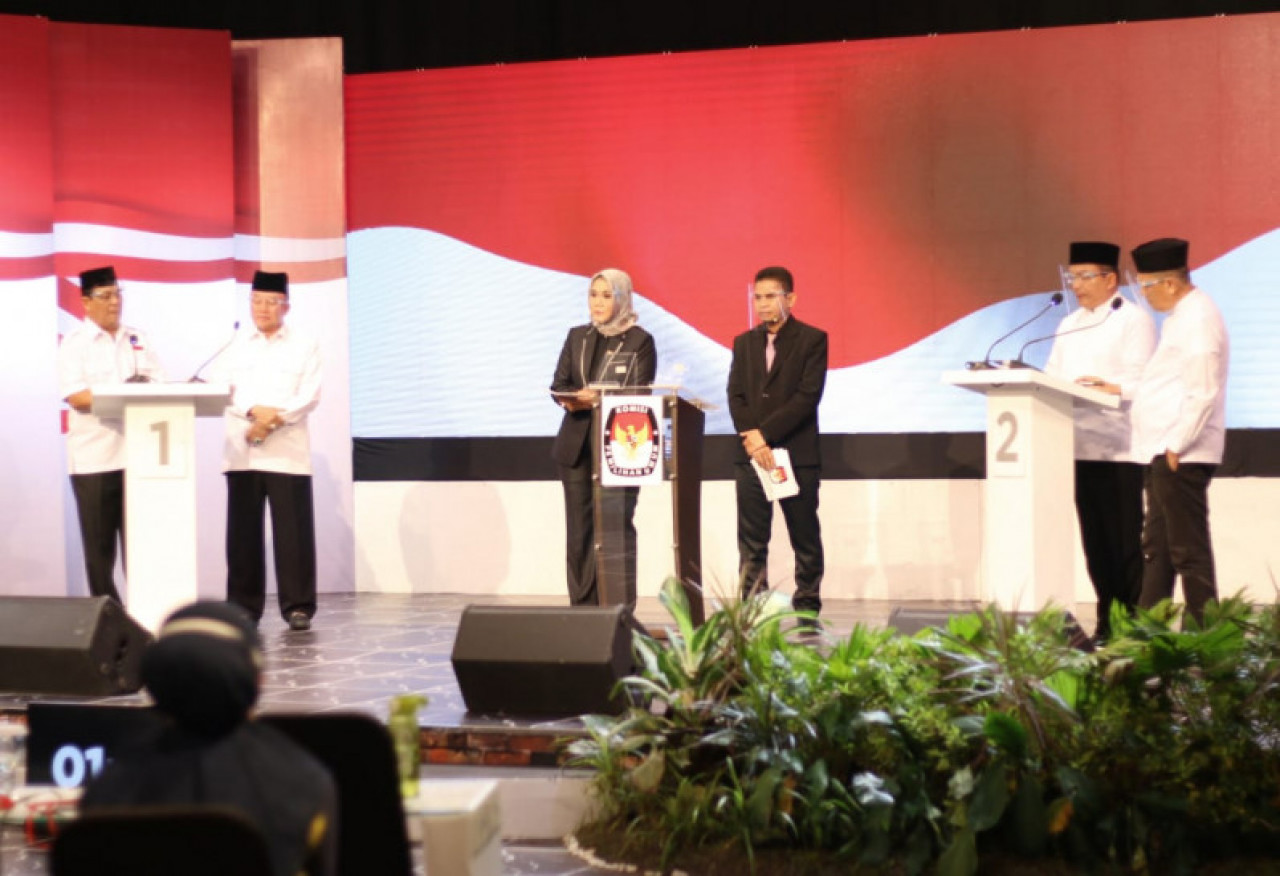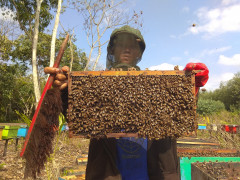Bagan Melibur Village's Efforts to Suppress Peat Fires using the Village Regulation concerning Ecosy
By ZamzamiThe Peat Management Commitment Puzzle from the 2020 South Kalimantan Local Elections

The South Kalimantan Province Governor and Deputy Governor Election were expected to serve as a medium for the candidates to present their ideas in dealing with environmental issues, which includes the South Kalimantan Province peat management. However, the candidate's attention to such a crucial issue has not become a main concern in the 2020 Local Election.
The two candidates competing to become the Governor and Deputy Governor of South Kalimantan, i.e. Sahbirin Noor-Muhidin (BirinMU) and Denny Indrayana-Difriadi Darjat (H2D), only discussed superficial issues related to peat management.
For example, the incumbent BirinMU, only mentions in general that the forest and land fires will be a strategic issue and will be resolved with a technology-based program in their Local Long-Term Development Plan (RPJP) vision-mission and program. However, it’s unclear how the incumbent candidates will commit to their effort in managing peatland conversion.
On the other hand, the vision and mission of H2D state that they have a primary program to ensure forest and peatland fire prevention and control programs' effectiveness. In addition, they also have an agenda in improving the peat swamp ecosystem (ERG) by engaging and empowering the community living in the ecosystem. However, similar to their rivals, H2D has not provided any details on how they will achieve these two programs if they are elected in the 2020 Local Election.
In the South Kalimantan Gubernatorial Election inaugural debate, which uses the theme of Law, Nationality, Human Rights, Agrarian Affairs, Politics, and Governance, the two candidates did not explain how committed they are with the peat conservation issues.
During the two-hour event, especially the session on human rights and agrarian issues, the topic of peat conservation was never brought up in the discussion. Denny Indrayana as the challenger was more inclined in highlighting the issue of South Kalimantan's mining pits. South Kalimantan has the 2nd highest number of mining pits in Indonesia. On the other, the incumbent Sahbirin Noor was busy fending off Denny's arguments by presenting the reforestation program or the Green Revolution.
In fact, according to Pantau Gambut's records, a number of crucial peat issues have not been properly handled by the policymakers. For example, the South Kalimantan Peatland Ecosystem Protection and Management Plan (RPPEG) has not been finalized, which results in rampant forest and land fires, both inside and outside of the company and corporate concession areas, as well as the agrarian conflicts between the community and corporations.
The RPPEG, which should serve as the basis for peat protection in the regions, has not been finalized due to a number of factors, such as a lack of encouragement from the executive agency to the difficulty of establishing a peat map for each region. Furthermore, there is no peat map per region which is a requirement for the RPPEG. The peat maps are only available on a national scale, hence it does not have the required resolution needed to prepare the RPPEG.
The Pantau Gambut Team has requested an interview with both candidates’ campaign teams but has not received an answer up to the publication of this article.
The Executive Director of Walhi South Kalimantan as well as the Coordinator of Simpul Jaringan Pantau Gambut South Kalimantan, Kisworo Dwi Cahyono, requested for the government to give serious attention and efforts to save the peat swamp ecosystem, especially with regards to the forest and land fire, regardless of who wins the election.
The reason is that peat issues, especially those related to the forest fires in South Kalimantan, remain prevalent. Walhi found that the number of hotspots tends to increase in July – September 2019 in South Kalimantan. Even the number of hotspots in July (approximately 300), increased drastically up to more than 5000 hotspots in September with the burned peat area reaching 45,911.2 hectares.
Kisworo further argues that the public must carefully choose their leaders to support their effort to protect the safety of the people and the environment. In addition, to also take the time to evaluate the candidate’s background and behavior to date, as well as their supporters. Leaders who are pro-environment will not destroy the environment for the sake of profit, they also would not grant a concession permit to companies that are destroying the forest and land, they will also take firm action against the fire perpetrators, especially corporations.
He also challenged the South Kalimantan’s new leaders to promise that they will implement pro-environment policies if they are elected, such as increasing the environment budget to at least match the allocation for the education budget, i.e. 20 %, and establishing a special agency to manage environmental issues.
Another response from Muhammad Arsyad Al Banjary, M Uhaib As'ad, Public Policy Observer - Kalimantan Islamic University (Uniska), admitted that he felt pessimistic that the local elections could resolve environmental issues, including the peat management issues. He said that the election would be more aptly defined as a democratic black market.
For example, the phenomenon of “buying up” political parties by the incumbent candidates prior to the 2018 local elections (Pilkada) in four districts, i.e. Tabalong, Tapin, Hulu Sungai Selatan, and Tanah Laut District. This further proves that democracy in South Kalimantan has been steered by the interest of capital owners. The local elections in South Kalimantan have generally led to a democratic black market, in which money speaks above all else.
In addition, almost all of the candidates are sponsored by financier groups or oligarchs. In practice, those who are elected will primarily serve the investors’ interests, even if they have to sacrifice environmental aspects.
Rather than depending on South Kalimantan’s Local Election, Uhaib suggested strengthening the civil society groups, to function as groups that could urge the government to take public policy issues more seriously.
He also assessed that civilian movement must be strengthened by eliminating the barriers and uniting the cross-sectoral community organizations. Moreover, according to him, South Kalimantan has no shortage of institutions with experts in their respective fields, which can be utilized as a strong capital for the movement.
"This can start from the campus, although campuses have now become a silent majority. Strengthen the basis, instill critical education in students," he said.
According to Uhaib, critical education can be disseminated to grassroots groups outside the student group. He gave an example in which student groups, local communities, and indigenous peoples can collaborate to provide assistance in addressing an issue. There, the civil society movement is expected to be stronger in pressuring the government in issuing public policies that are more supportive towards sustainable environmental issues.



